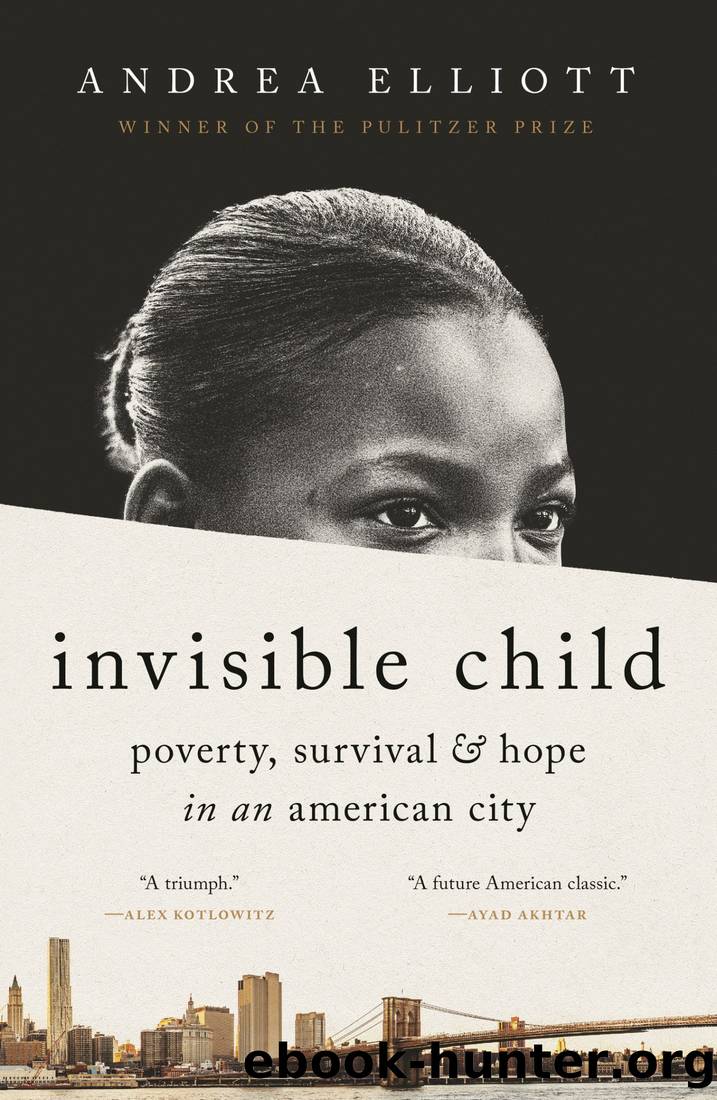Invisible Child: Poverty, Survival & Hope in an American City by Andrea Elliott

Author:Andrea Elliott [Elliott, Andrea]
Language: eng
Format: epub
Tags: Biography & Autobiography, Cultural; Ethnic & Regional, African American & Black, Social Science, Poverty & Homelessness, Social Classes & Economic Disparity
ISBN: 9780812986945
Google: BzBGEAAAQBAJ
Publisher: Random House Publishing Group
Published: 2021-11-15T00:11:20.336523+00:00
* * *
â
Two days after Dasaniâs argument on the bus, her siblings are nervously watching as an ACS supervisor inspects their Staten Island apartment.
A month has passed since Judge Lim ordered Chanel to take a drug test. She never showed up, hoping the matter would be forgotten. For a while, it seemed to work. The agencyâs âprogress notesâ show little progress with either parent.
âWhen was their last drug test?â the ACS supervisor writes. âWhat were the results?â
Supreme stands in the living room as the supervisor questions the children, noting that they have no âmarks/bruises on their face, hands, etc.â She asks to see Papa, but he is sleeping. The supervisor checks his room âto ensure that the child was alive and he appeared to be,â she writes, adding, âThe family is in need of beds.â
ACS has visited the apartment six times in the last month. Chanel is never home. But the caseworker assigned to the family, Marisol Quintero, has found the children in good spirits, with Maya and Hada doing their homework, Avianna sweeping, Lee-Lee playing with toys, Nana watching television, and Papa bragging that he is âbehaving much better in school.â
Supreme is also in reform mode. He has made a flyer advertising his freelance barber hours, and he has near-perfect attendance at his methadone maintenance program, testing negative for drugs. But his wife is another story.
Chanel comes and goes at odd hours, telling Supreme that she is âdowntown,â which is code for Brooklynâspecifically, the back entrance of a Burger King on the corner of Fulton and Pearl. This small stretch of pavement is the province of addicts, beggars, boosters, dealers, sex workers, pimps, and other people cycling between jail and the street.
When Supreme hears the word âdowntown,â he assumes that Chanel is getting high. Her pattern is to deny it. Only later, when she is clean again, will Chanel acknowledge the truthâusually as an act of reflection, worded in the past tense. Yeah, I was getting high. Supreme no longer bothers to ask. He simply tells Chanel to âturn yourself in,â by entering rehab.
âYouâre starting off with a clean slate, you know what I mean? A fresh new track. A fresh new piece of paper and everything you do from then on is what they gonna document. So now you can write your own storyâ¦. Get a job. I get a job. We do what we gotta do. And then we move out of New York like we planned to do.â
Sometimes Chanel listens. She enrolled last month in an outpatient opioid-dependency program at Mount Sinai Beth Israel in Manhattan, where she admitted to recent âopiate use,â telling the intake counselor that she supported her habit by selling candy. A few weeks later, Lee-Lee had her seizure. The next morning, Chanel left the hospital to attend her drug program. By the following morning, April 8, she had dropped out.
That same day, ACS referred the family to âpreventive services,â adding a new form of scrutiny. When Chanel thinks about child
Download
This site does not store any files on its server. We only index and link to content provided by other sites. Please contact the content providers to delete copyright contents if any and email us, we'll remove relevant links or contents immediately.
Harry Potter and the Goblet Of Fire by J.K. Rowling(3107)
Never by Ken Follett(2924)
Unfinished: A Memoir by Priyanka Chopra Jonas(2922)
Machine Learning at Scale with H2O by Gregory Keys | David Whiting(2335)
The Man Who Died Twice by Richard Osman(2318)
Fairy Tale by Stephen King(2107)
Will by Will Smith(2085)
Rationality by Steven Pinker(1783)
The Storyteller by Dave Grohl(1676)
The Dark Hours by Michael Connelly(1590)
The Dawn of Everything: A New History of Humanity by David Graeber & David Wengrow(1584)
The Stranger in the Lifeboat by Mitch Albom(1568)
Cloud Cuckoo Land by Anthony Doerr(1455)
New Morning Mercies: A Daily Gospel Devotional by Paul David Tripp(1410)
Friends, Lovers, and the Big Terrible Thing by Matthew Perry(1356)
The Becoming by Nora Roberts(1349)
Crying in H Mart by Michelle Zauner(1340)
Einstein: His Life and Universe by Walter Isaacson(1327)
A Short History of War by Jeremy Black(1313)
